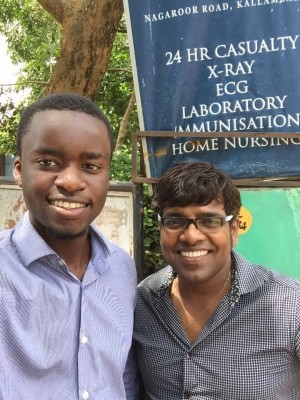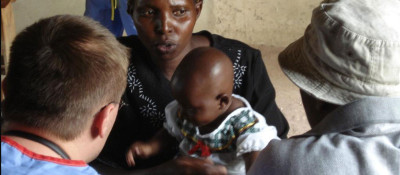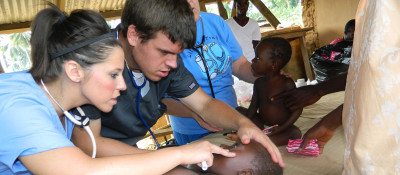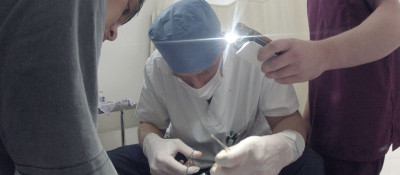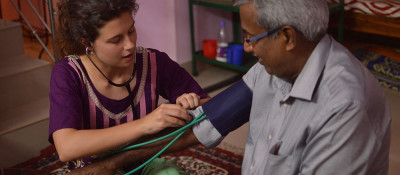You have to pay for medical care in India, which means that many people don’t take themselves to the doctor until their condition becomes so bad that something must be done, sadly it’s often too late. Additionally, the unique social hierarchy in India means that many people who are lower down on the social ladder (the caste system) feel uncomfortable visiting doctors. This means that during your time with us in India you will see highly advanced medical conditions that you are unlikely to ever see at home.
In India you have the opportunity to work at a large teaching hospital on the outskirts of Trivandrum or smaller family healthcare hospital near the coast.
Teaching hospital
The main base for our elective placements in India is a large hospital, medical college and research foundation on the outskirts of Trivandrum. The hospital and college are located on a sprawling and picturesque 32-acre site about a 40 minute commute from our accommodation.
This modern hospital has 600 beds, 13 operation theatres (includes cardio-thoracic theatre), state-of-the-art diagnostic laboratories, fully computerized network of hospital information system and radio diagnostic imaging department.
Departments available include:
A & E
Anesthesiology
Cardiac care
Community medicine
Dental
Dermatology
ENT
Forensic medicine
General Medicine
Intensive
Neurology
Obstetrics and Gynaecology
Ophthalmology
Orthopedics
Paediatrics
Pharmacology
Physiotherapy
Radiology
Surgery
As a teaching hospital and medical college, there are also opportunities to attend lectures and practical sessions with Indian medical students (although this is not compulsory) during term times, which are broadly similar to those at home.
Family healthcare centre
The Healthcare Centre placement is located close to Varkala Beach, one of the most stunning beaches in Kerala
The health care centre was founded by Dr Kumar when he was working in the area and was taken by the high incidence of lifestyle related diseases. He saw that using a different approach to that commonly used by GPs could bring about health improvement. His aim was to create a different type of health care centre, offering a more holistic and evidence based approach relying mainly on the three traditional diagnostic tools: clinical symptoms, investigations and examination findings.
More than 60% of the local adult population suffers from diabetes. Many also suffer from hypertension, metabolic syndrome, obesity, substance abuse, family problems and mental illness.
The facilities of the hospital comprise an outpatient clinic, an inpatient ward of approximately 10 beds, a de-addiction centre able to treat 10 patients on a 21 day residential programme, a physiotherapy clinic, a small 24hr casualty department and a psychiatric residence for 10 patients.
Accommodation on this project is in our group accommodation, usually sharing with others. You will be joined in Trivandrum by others on our medical, teaching, media and business projects.
Costs:
Cost in £
| 2 weeks | 3 weeks | 4 weeks | 5 weeks | 6 weeks |
| £1,295 | £1,395 | £1,495 | £1,595 | £1,695 |
Cost in Euros
| 2 weeks | 3 weeks | 4 weeks | 5 weeks | 6 weeks |
| €1,595 | €1,695 | €1,795 | €1,915 | €2,045 |
Cost in US $
| 2 weeks | 3 weeks | 4 weeks | 5 weeks | 6 weeks |
| $1,595 | $1,695 | $1,795 | $2,035 | $2,275 |
Cost in Auz $
| 2 weeks | 3 weeks | 4 weeks | 5 weeks | 6 weeks |
| Au$2,395 | Au$2,595 | Au$2,695 | Au$2,895 | Au$3,095 |
Cost in £
| Extra weeks | Extra months | Language course | Orphanage project |
| £150 | £595 | £100 (per wk) | £200 |
Cost in Euros
| Extra weeks | Extra months | Language course | Orphanage project |
| 200€ | 800€ | 135€ (per wk) | 240€ |
Cost in US $
| Extra weeks | Extra months | Language course | Orphanage project |
| $240 | $995 | $160 (per wk) | $240 |
Cost in Auz $
| Extra weeks | Extra months | Language course | Orphanage project |
| Au$300 | Au$1,190 | Au$200 (per wk) | Au$360 |
Other Destination Information
[accordion clicktoclose=true scroll=true][accordion-item title="Accommodation"]
During your time with us in India you will be staying in accommodation that we rent from the local people. This house is quite spacious and clean and volunteers share a dormitory style room with 3 other people.
Occasionally, we place volunteers with local families. This is usually during off-peak times when only a handful of volunteers are with us in India. If this is the case we will send you full details of your family accommodation before your departure.
Whether you are teaching, on the journalism placement or working in hospitals, all the volunteers stay together in the same area which means that you are never far away from someone to socialise with in the evenings or travel with at weekends. Even if you’re based a little further away, most of the volunteers come to Trivandrum to begin their weekend travels or activities.
Usually, two to four people will share a room. The standard of the accommodation will basic and not be what you are used to at home so please don’t expect all mod cons, but it will be clean and tidy.
The house has running water and electricity, but please be aware that the water is delivered and stored in a tank above the house so there may be times when it runs out, and the electricity supply is unreliable and may often fail. India often has problems with it’s electricity supply and will be cut off at times with no warning.
Even breakfasts in India have an element of curry spices to them. There will be someone there to look after the house and they will cook your meals, which means that if you can’t quite get used to Indian food then they can cook something similar to what you are used to at home.
Travelling around Trivandrum is easy whether you are teaching or on a medical project, you placement will be easy to reach by auto rickshaw or bus.
Our staff will be on hand during office hours if you have any general queries and only a phone call away outside office hours if there’s something much more urgent.
[/accordion-item][accordion-item title="Location"]
Highlights – Kerala
Edged by a thread of unbroken beach line, the Kerala’s heart is composed of intensely green paddy fields and a unique network of rivers and lagoons. Upland Kerala, relatively little visited, is composed of hills thickly wooded with teak and rubber.
Trivandrum which is also the state capital has an exceptionally fine museum set in an amusement park.
Kovalam, one of the most popular beaches in the country. Sri Padmanabhaswamy temple in Trivandrum, and Padmanabhapuram Palace are important monuments.
Cochin has been Kerala’s center of maritime trade for innumerable centuries. Jew town, complete with an immaculately preserved synagogue, has a flavor all its own, while Tripunathura, at the other end of the city, has many traditional houses with central courtyards.
Kerala’s multitude of faiths – Islam, Judaism, and a host of sects of Christianity and Hinduism – all coexist harmoniously. Kerala’s traditions of dance forms, which originated from temple worship, can be witnessed at regularly held performances.
A five hour drive from Cochin leads into thickly forested hills, past rubber and spice plantations, and into southern India’s tea growing district headquartered at the charmingly old world Munnar.
From Kottayam to Alleppey is a world of palm fringed waterways, a route which is covered by motor launch. Elderly sailboats, long barges transporting tons of coconuts and tiny skiffs used to transport children to school are common sights on these backwaters.
Climate
Kerala has a tropical Climate and remains pleasant for most of the year. It is summer time from April to June. The maximum temperature remains around 33 degrees centigrade. The South West Monsoon touches the state in June and remains till September however not much difference in temperature can be felt, though humidity increases and rainfall can last for a couple of days at a stretch. Winter is from October to January and temperature drops slightly.
Money matters
India is an incredibly cheap country to visit. Meals in restaurants can cost pennies and rooms in nice hotels £2-3 pounds per night.
You will have weekends free to travel and visit the sights so do take some spending money for food, accommodation and souvenirs.
Exactly how much to take is a matter of great debate but most who have travelled to India recommend that you could probably get by allowing £15-30 per weekend spending money. If you can, take a little extra just in case to allow for emergencies or those ‘must have’ souvenirs.
You cannot get Indian currency outside of India so it’s best to take your spending money as travellers cheques or cash. Credit and debit cards are not widely accepted in India but are useful to take as a back-up. You can usually draw money out on credit and debit cards from most banks in India.
Travellers cheques are the safest way to carry your spending money to India as they can be easily replaced if lost or stolen. In our experience we’ve found that American Express travellers cheques offer the best service but most travellers cheques are accepted. It’s probably best to avoid ‘Stephen Cook’ travellers cheques as some banks do not accept them.
However, do take some cash with you as travellers cheques are difficult to change (often requiring hours of queuing in banks).
You can take cash as sterling, Euros or US dollars. All are easy to change in India.
Arrival Information
You should arrange your flights to arrive at Trivandrum (Thiruvananthapuram) International Airport. A number of international carriers fly to Trivandrum, including Air India and Gulf Air.
[/accordion-item][accordion-item title="Meet The Team"]
Country Director – Babu Menon
Our office in India is headed by P.G.R Menon (Babu). Babu was born and raised in Kerala and was instrumental in the decision to locate Global Medical Projects – India in the country’s most beautiful state.
The son of a banker, Babu went to school and later University in Kerala, graduating with a degree in Botany and Zoology. After his degree Babu travelled to Calcutta to complete a post-graduate course in management but was brought back home by the sudden and un-expected death of his Father.
Following the death of his father, Babu stayed in Kerala and decided to follow in his father’s footsteps, joining the banking industry where he spent many happy years. It was during this time that he met his wife, Thankam, a widow with two children that had lost her husband to a car accident. They married in 1980 and a short time later, his wife, a nursing professional, was recruited to the Ministry of Health in Saudi Arabia. Babu gave up his beloved Kerala a short time later and joined his wife, working as the head of Human Resources for a training establishment based in Abah.
With their two children now qualified professionals and working overseas, his son an engineer in the US, his daughter a dentist in the UK, Babu decided to look for a new challenge and during a trip to the UK to see his daughter, met the GVP director and GVP in India was born!
Babu is the ideal person to run our projects in Kerala. A vociferous promoter of Kerala, he believes that no other state in India is as beautiful or offers as much opportunity.
Incredibly well connected, if Babu doesn’t know someone who can help us arrange a project, he probably knows someone who does. As a result, our projects in India are quite unique.
His background in banking has given him a meticulous eye for detail which he applies to the arrangement of all our placements.
His experience in HR in Saudi Arabia has also given him experience in working with people from different cultures and an understanding of the challenges facing people living and working in new country for the first time.
Babu is driven by a passion to interact with people from different cultures and enjoys meeting volunteers with their varying backgrounds and personalities. He is committed to arranging projects that are worthwhile, not only to the participants but also to the local community which makes him the perfect Director of our programme in India.
Babu is looking forward to meeting you when you arrive in India!
“Be happy and make others happy and a wellbeing will come to your own life” Babu Menon.
[/accordion-item][/accordion]
Photos from our projects in India (on Facebook, opens in new tab)
Our Costs Include:
[accordion clicktoclose=true][accordion-item title=”Accommodation”]
Accommodation on your project will be with either local families or in group accommodation. You exact accommodation depends on the number of volunteers and your project.
All accommodation is checked by our overseas staff and host families vetted. If you don’t feel comfortable in your accommodation, do please let us know as soon as possible and our overseas staff will do their best to make you more comfortable.
However, please keep in mind that you will be living in lesser economically developed countries so please don’t expect the same standards as home. Access to running water, electricity and other things that we take for granted WILL be limited but we’ll do our best to make sure you have the best that’s possible.
[/accordion-item][accordion-item title=”Pre-departure briefing”]
Our UK team is on hand to answer any questions that may pop up before you go. Please don’t hesitate to call or email to chat about anything that may be concerning you. You should especially not worry about asking any questions you may consider that we’ll think is stupid. The chances are that we probably asked exactly the same questions before we headed off on our travels!
You will receive pre-departure information that will tell you more about your accommodation and placement. This will arrive about 4 weeks before you depart. We can’t send you this immediately as exactly where you stay depends on the numbers that join us. However, by 4 weeks before you depart we will have a good idea of how many people are joining us and we’ll finalise the details of your accommodation.
[/accordion-item][accordion-item title=”Meeting you at the airport”]
Arriving in a new country for the first time can be quite daunting so our overseas team will be there to meet you with a big sign and even bigger welcome!
[/accordion-item][accordion-item title=”Induction and orientation”]
We think that it’s important to give you a thorough introduction to your new home for the next few months therefore, our overseas team will give you an induction and orientation covering everything you need to know from basic customs to where to change money.
[/accordion-item][accordion-item title=”Support from our overseas staff”]
Our overseas team are not just there to meet you at the airport. They’re also not there to molly cuddle you either. Our overseas team is on hand during office hours to do anything they can to help you get the most out of your experience. You will also be given out of office contact details to be used in the event of emergencies, so please rest assured that in the unlikely event that anything goes wrong, our overseas team will be there to help in whatever way they can.
[/accordion-item][accordion-item title=”Medical placement and donation”]
We have worked carefully to develop links with medical staff at hospitals and clinics in all our partner countries. It takes time for our overseas teams to develop and maintain these links so that we can continue to offer you the best medical experience possible.
We think it’s fair that the hospital should receive something in return for supporting you and Global Medical Projects so part of the project cost includes a donation to your host hospital.
[/accordion-item][accordion-item title=”Food (during week)”]
During your time with us we will make sure that your food is provided. Please note that sometimes this will be provided by your host family and sometimes by your host organisation. Where this is the case it is extremely likely that this food will be local food. Most of the time this will not quite be what we’re used to and can take some time to get used to. Rest assured it will be hygienically prepared and nutritious but it will be difficult for them to prepare foods which you are used to at home.
We’re sure that for most of you, eating the local food is part of the experience. If you don’t like the food, we urge you to try to persevere. Ultimately, if you are just not enjoying the experience we will do our best to make alternative arrangements. Please keep in mind however, that the availability of western foods maybe extremely limited and/or expensive so it may not always be possible to change things that much!
Most people elect to go travelling at weekends, so food isn’t always available at this time, particularly in those locations where we have our own accommodation as we often give the cooks the weekend off.
[/accordion-item][/accordion]
Not Included:
[accordion tag=h3 clicktoclose=true][accordion-item title=”Flights”]
We’re not a travel company, and as such we do not arrange flights. However, we can help you to make the necessary arrangements and suggest people to speak to.
Additionally, many people join us as part of a world trip so it’s often easier for you to arrange your travel as part of a round the world ticket.
Don’t hesitate to contact us if you would like help arranging your flights.
[/accordion-item][accordion-item title=”Insurance”]
As many people join us as part of a world trip, we do not include insurance as part of the projects. However, we are happy to introduce good companies that can provide you with excellent and affordable cover.
[/accordion-item][accordion-item title=”Spending Money”]
You will need additional spending money for travel to work, weekend excursions and gifts. Exactly how much to take is a matter of great debate but contact us and we’ll be happy to give you a rough guideline on how much you will need.
[/accordion-item][accordion-item title=”Visas”]
Many of the destinations require you to purchase a visa. We can arrange the visas for you but this will be an additional cost of up to £100.
[/accordion-item][accordion-item title=”Inoculations”]
Most of our countries will require you to be inoculated against diseases that have been eradicated at home. We can advise on which inoculations you will need but will encourage you to visit your doctor or a local travel clinic where they will discuss the best vaccinations for you.
Some of these vaccinations will incur costs so budget accordingly.
[/accordion-item][accordion-item title=”Food during weekend or independent travels”]
We’re happy to provide food when you are on a projects with us or staying in our accommodation but when travelling you will need to buy your own food. In most countries good local food is incredibly cheap. Western food is a luxury and is priced accordingly!
[/accordion-item][/accordion]

